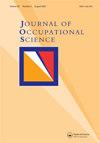了解希腊COVID-19期间儿童职业模式和职业参与形式的中断:一项探索性研究
IF 2.4
Q1 SOCIAL SCIENCES, INTERDISCIPLINARY
引用次数: 1
摘要
摘要背景职业参与被认为对儿童的健康、发展和社会联系至关重要。由于全球新冠肺炎大流行以及随后希腊政府下令实施的限制措施,学龄儿童的职业参与模式发生了改变。目的本研究的目的是探索在2020年新冠肺炎第一波疫情期间,限制措施如何扰乱学龄儿童的职业模式,以及他们在希腊从事选定职业的方式。设计/方法275名6-12岁的儿童在线完成了儿童参与和享受评估(CAPE)。使用描述性统计对数据进行分析,以确定在新冠肺炎相关限制期间职业模式和职业参与形式的变化,以及年龄或性别是否与所确定的任何变化模式相关。调查结果儿童更多地参与以家庭为基础的非正式职业,尤其是娱乐性职业,他们的职业参与形式也发生了变化。性别显然影响了儿童参与的职业类型,与家庭成员一起从事共同职业的时间也有所增加。结论本文所述研究的独特之处在于,该研究是在希腊第一波新冠肺炎期间进行的。研究结果强调了在全球疫情背景下,限制儿童的职业模式和职业参与形式的影响。本文章由计算机程序翻译,如有差异,请以英文原文为准。
Understanding disruptions to children’s patterns of occupation and forms of occupational engagement during COVID-19 in Greece: An exploratory study
ABSTRACT Background Occupational engagement and participation is considered essential for children’s health, development, and social connectedness. Due to the global COVID-19 pandemic and the ensuing government ordered restrictions in Greece, school aged children’s patterns of occupational engagement were altered. Purpose The purpose of this study was to explore the ways in which restrictions disrupted school aged children’s occupational patterns and the ways in which they engaged in chosen occupations in Greece during the first wave of COVID-19 in 2020. Design/methodology Two hundred and seventy-five children aged 6- to 12-years old completed the Children’s Assessment of Participation and Enjoyment (CAPE) online. The data were analyzed using descriptive statistics to identify how the patterns of occupation and forms of occupational engagement changed during the COVID-19 related restrictions and whether age or gender could be correlated to any altered patterns identified. Findings Children became more involved in home-based informal occupations—particularly recreational occupations—and the forms of their occupational engagement altered. Gender apparently influenced the types of occupations in which the children participated and there was an increase in the amount of time spent with family members in co-occupations. Conclusion The study described in this article was unique in that it was conducted during the first wave of COVID-19 in Greece. Its findings highlight the impacts of restrictions on children’s patterns of occupation and forms of occupational engagement within a global pandemic context.
求助全文
通过发布文献求助,成功后即可免费获取论文全文。
去求助
来源期刊

Journal of Occupational Science
SOCIAL SCIENCES, INTERDISCIPLINARY-
CiteScore
4.30
自引率
41.70%
发文量
46
 求助内容:
求助内容: 应助结果提醒方式:
应助结果提醒方式:


